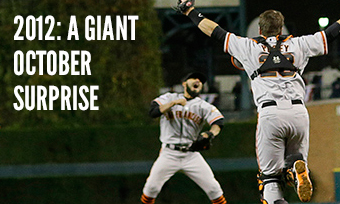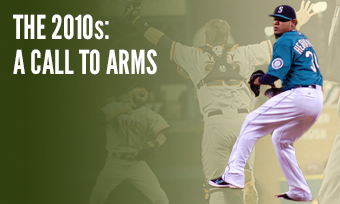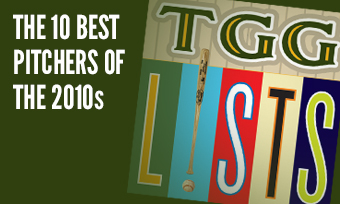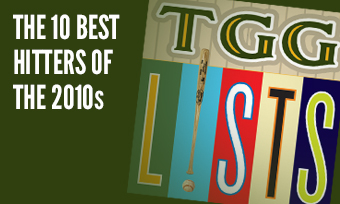The Yearly Reader
Leaders and Honors, 2012
Our list of baseball’s top 10 hitters and pitchers in both the American League and National League for the 2012 baseball season, as well as the awards and honors given to the game’s top achievers of the year.
The National League’s Top 10 Hitters, 2012
Bold type in brick red indicates league leader.
1. Ryan Braun, Milwaukee
Key Numbers: .319 average, 108 runs, 191 hits, 36 doubles, 41 home runs, 112 RBIs, 30 stolen bases.
Braun remained the National League’s hottest bat, presumably this time without the help of PEDs. (Biogenesis would prove the presumption wrong a year later.)
2. Andrew McCutchen, Pittsburgh
Key Numbers: .327 average, 107 runs, 194 hits, 29 doubles, 6 triples, 31 home runs, 96 RBIs, 20 stolen bases.
The Pirates’ great post-Barry Bonds hope enjoyed his most impressive numbers to date—but they weren’t enough to keep the Pirates from a late collapse and their 20th straight losing campaign.
3. Buster Posey, San Francisco
Key Numbers: .336 average, 178 hits, 39 doubles, 24 home runs, 103 RBIs.
Bouncing back from a brutal season-ending home plate collision a year earlier, Posey snagged the NL MVP and, formally, the NL batting title—after disgraced teammate Melky Cabrera (.346 and just one plate appearance shy of qualification) asked MLB to disqualify him for steroid use.
4. Chase Headley, San Diego
Key Numbers: .286 average, 95 runs, 173 hits, 31 doubles, 31 home runs, 115 RBIs, 86 walks, 17 stolen bases.
With a prodigious second half, the switch-hitting third baseman who never hit more than 14 home runs in any of 11 other seasons briefly acquired the Mojo that Adrian Gonzalez left behind at Petco Park.
5. Aramis Ramirez, Milwaukee
Key Numbers: .300 average, 92 runs, 171 hits, 50 doubles, 27 home runs, 105 RBIs. 12 hit-by-pitches.
Ramirez became Ryan Braun’s new protective pal in the Milwaukee lineup, replacing the Detroit-bound Prince Fielder.
6. Giancarlo Stanton, Miami
Key Numbers: 123 games, .290 average, 30 doubles, 37 home runs, 86 RBIs, .608 slugging percentage.
The intimidating but injury-prone slugger missed a whole month to arthroscopic knee surgery—otherwise, the NL home run title would have been his, as would have more than a few extra MVP votes.
7. Carlos Gonzalez, Colorado
Key Numbers: 135 games, .303 average, 89 runs, 31 doubles, 5 triples, 22 home runs, 85 RBIs, 20 stolen bases.
Four of CarGo’s 22 home runs came in consecutive at-bats at the end of May, the 22nd major leaguer ever to accomplish that.
8. Matt Holliday, St. Louis
Key Numbers: .295 average, 95 runs, 177 hits, 36 doubles, 27 home runs, 102 RBIs.
Holliday once had to prove he could achieve strong numbers outside of Colorado; in 2012, he met a different dare by proving he could hit without being protected in the lineup by Anaheim-bound Albert Pujols.
9. David Wright, New York
Key Numbers: .306 average, 91 runs, 178 hits, 41 doubles, 21 home runs, 93 RBIs, 81 walks, 15 stolen bases.
Bouncing back from an injury-riddled, subpar 2011, Wright tore off to an incredible start (hitting .405 on May 24) and set franchise records for career hits and RBIs.
10. Aaron Hill, Arizona
Key Numbers: .302 average, 93 runs, 184 hits, 44 doubles, 6 triples, 26 home runs, 85 RBIs, 14 stolen bases.
After losing it in Toronto following a splendid 2009 campaign, Hill regrouped in Phoenix and became the second player to hit for the cycle twice in a year—collecting his 1,000th career hit during the second such achievement.
The American League’s Top 10 Hitters, 2012
1. Mike Trout, Los Angeles of Anaheim
Key Numbers: 139 games, .326 average, 129 runs, 182 hits, 27 doubles, 8 triples, 30 home runs, 83 RBIs, 49 stolen bases, 5 caught stealing.
Miguel Cabrera may have been baseball’s first triple-crown hitter in 45 years, but Trout—a mere 20 years of age—had the more complete offensive season.
2. Miguel Cabrera, Detroit
Key Numbers: .330 average, 109 runs, 205 hits, 40 doubles, 44 home runs, 139 RBIs, 28 grounded into double plays, .606 slugging percentage.
Miggy’s triple-crown effort may never had happened had he not been wearing sunglasses during a spring training game, in which a ground ball wild-hopped right underneath his right eye at third base. Fortunately, the shades took the brunt of the blow.
3. Josh Hamilton, Texas
Key Numbers: .285 average, 103 runs, 31 doubles, 43 home runs, 128 RBIs.
In his final year at Arlington before riding the Anaheim Express toward hundreds of millions as did Albert Pujols and ex-teammate C.J. Wilson, Hamilton punched out the only four-homer game in Rangers franchise history; he never had a three-homer game.
4. Edwin Encarnacion, Toronto
Key Numbers: .280 average, 93 runs, 42 home runs, 110 RBIs, 84 walks, 11 hit-by-pitches, 13 stolen bases.
Relieved of his duties at third base—where defensively he was terrible—Encarnacion became far more relaxed (and monstrous) at the plate as he split his time between first base and DH.
5. Prince Fielder, Detroit
Key Numbers: 162 games, .313 average, 83 runs, 182 hits, 33 doubles, 30 home runs, 108 RBIs, 85 walks, 18 intentional walks, 17 hit-by-pitches.
In his first year at Boston, Gonzalez didn’t display the monster power many expected but, otherwise, no one was complaining; he also asked the Padres, his former employer, how they liked him now after going 8-for-14 in three interleague games against them.
6. Robinson Cano, New York
Key Numbers: .313 average, 105 runs, 196 hits, 48 doubles, 33 home runs, 94 RBIs, 22 grounded into double plays.
The surefire All-Star second baseman used new Yankee Stadium’s short right-field porch more to his advantage than usual, powering 22 of his 33 home runs at home.
7. Adrian Beltre, Texas
Key Numbers: .321 average, 95 runs, 194 hits, 33 doubles, 36 home runs, 102 RBIs.
Beltre, who hit in front of Shawn Green when he belted four homers in 2002 and behind Josh Hamilton when he did the same earlier this season, was inspired enough to produce his lone career regular season hat trick in August.
8. Josh Willingham, Minnesota
Key Numbers: .260 average, 85 runs, 30 doubles, 35 home runs, 110 RBIs, 14 hit-by-pitches.
The first 30-homer guy in the then-short history of spacious Target Field, Willingham enjoyed career highs in dingers and RBIs before a rapid decline over the next few years as he entered his mid-30s.
9. Billy Butler, Kansas City
Key Numbers: .313 average, 192 hits, 32 doubles, 29 home runs, 107 RBIs, 20 grounded into double plays.
It was hard to find a weakness in the bulky (6’1”, 240 lbs.) designated hitter, hitting .300 both home and away, against lefties and righties, and every month of the year except May.
10. Curtis Granderson, Detroit
Key Numbers: .232 average, 102 runs, 43 home runs, 106 RBIs, 75 walks, 195 strikeouts, 10 stolen bases.
Slowly evolving into one of baseball’s most potent sub-.250 hitting threats, Granderson made a career-low batting average scary to opponents by knocking in and scoring 100 runs each and hitting over 40 homers for the second straight year—with three of those drilled in the first hat trick by a player at the new Yankee Stadium.
The National League’s Top 10 Pitchers, 2012
1. R.A. Dickey, New York
Key Numbers: 2.73 ERA, 20 wins, 6 losses, .769 win percentage, 33 starts, 5 complete games, 3 shutouts, 233.2 innings, 230 strikeouts, 25 grounded into double plays.
Dickey overcame a season-long muscle tear in his abdomen and a weak Mets squad to become, at 37, the first knuckleballer to win the Cy Young Award while the setting the franchise mark for consecutive scoreless innings (33.2).
2. Clayton Kershaw, Los Angeles
Key Numbers: 2.53 ERA, 14 wins, 9 losses, 32 starts, 227.2 innings, 229 strikeouts, 8 stolen bases allowed, 23 caught stealing/picked off.
Twenty-seven pitchers won more games in the majors than Kershaw—but no one had a better ERA.
3. Johnny Cueto, Cincinnati
Key Numbers: 2.78 ERA, 19 wins, 9 losses, .679 win percentage, 33 starts, 217 innings, 49 walks, 12 hit-by-pitches, 1 stolen base allowed, 18 caught stealing/picked off.
Sunny rays made Cueto’s days as the Cincinnati ace finished 12-2 with a 1.99 ERA in midday starts; overall, he missed out on a 20th win when he left trailing 3-2 in his last start—only to have the Reds come back to win.
4. Gio Gonzalez, Washington
Key Numbers: 2.89 ERA, 21 wins, 8 losses, .724 win percentage, 32 starts, 199.1 innings, 10 wild pitches.
Given to the Nationals from Oakland in exchange for four players (none of which did terrible well for the A’s), Gonzalez set the franchise record for wins, became the first Washington-based pitcher to nab 20 since Bob Porterfield for the 1953 Senators, and collected both his first complete-game win and first home run in the same start.
5. Kris Medlen, Atlanta
Key Numbers: 1.57 ERA, 10 wins, 1 loss, 1 save, 1 blown save, 50 appearances, 12 starts, 138 innings, 23 walks.
Lumped into the bullpen to start the year as he recovered from Tommy John surgery, Medlen was promoted back to the rotation in July—and went 9-0 with a 0.97 ERA in 12 starts, with a major league season-best 35.1 consecutive scoreless inning streak.
6. Kyle Lohse, St. Louis
Key Numbers: 2.86 ERA, 16 wins, 3 losses, .842 win percentage, 33 starts, 211 innings, 38 walks.
The 33-year-old veteran was tough in the clutch, allowing a slim .184 batting average with runners in scoring position.
7. Craig Kimbrel, Atlanta
Key Numbers: 1.01 ERA, 3 wins, 1 loss, 42 saves, 3 blown saves, 63 appearances, 62.2 innings.
Opponents simply couldn’t figure out Kimbrel’s combination of electric fastballs and wicked curves; they hit a ridiculously low .126 against him.
8. Matt Cain, San Francisco
Key Numbers: 2.79 ERA, 16 wins, 5 losses, .762 win percentage, 32 starts, 219.1 innings.
Notoriously given poor run support, Cain was given more runs per start (4.6) than in any of his other full-time seasons as starter; it naturally led to, easily, his best win percentage. (Throwing the franchise’s first-ever perfect game didn’t hurt.)
9. Aroldis Chapman, Cincinnati
Key Numbers: 1.51 ERA, 5 wins, 5 losses, 38 saves, 5 blown saves, 68 appearances, 71.2 innings.
A most peculiar year for the young, flamethrowing Cuban émigré; he wasn’t given the closer role in Cincinnati until late May, didn’t give up a run through his first 29 innings, was arrested for excessive speeding on an interstate (on a suspended license, no less) and had a mistress on the road who was allegedly tied up and robbed in the hotel room she and Chapman were sharing.
10. Tim Hudson, Atlanta
Key Numbers: 3.62 ERA, 16 wins, 7 losses, .696 win percentage, 28 starts, 179 innings.
The 37-year-old warhorse missed the season’s first month as he finished his recovery from back surgery, then sparkled with vintage effort; his career record at season’s end was a terrific 197-104.
The American League’s Top 10 Pitchers, 2012
1. David Price, Tampa Bay
Key Numbers: 2.56 ERA, 20 wins, 5 losses, .800 win percentage, 31 starts, 211 innings, 20 grounded into double plays.
Price became both the first Cy recipient and 20-game winner in Tampa Bay history.
2. Jered Weaver, Los Angeles Angels of Anaheim
Key Numbers: 2.81 ERA, 20 wins, 5 losses, .800 win percentage, 30 starts, 188.2 innings.
Weaver’s outstanding year—matching Price’s record—featured his sole career no-hitter that actually took 28 outs to complete; one of two Minnesota runners to reach on the day did so via a third-strike passed ball.
3. Justin Verlander, Detroit
Key Numbers: 2.64 ERA, 17 wins, 8 losses, .680 win percentage, 33 starts, 6 complete games, 5 shutouts, 238.1 innings, 239 strikeouts.
The tall Detroit ace was a close second to David Price in the AL ERA race, and a very close second to him in the Cy Young vote (153-149); his streak of 63 straight starts throwing six or more innings—15 shy of Bob Gibson’s all-time record—was ended when rain wouldn’t allow him to go past five frames on July 31 at Boston.
4. Fernando Rodney, Tampa Bay
Key Numbers: 0.60 ERA, 2 wins, 2 losses, 48 saves, 2 blown saves, 76 appearances, 74.2 innings, 15 walks.
Helping out David Price on the backend, the Rays’ Rodney set a then-record for the lowest ERA by a closer (minimum 50 innings).
5. Jim Johnson, Baltimore
Key Numbers: 2.49 ERA, 2 wins, 1 loss, 51 saves, 3 blown saves, 71 appearances, 68.2 innings, 8 grounded into double plays.
Johnson was the primary reason the Orioles won 29 of 38 one-run games while breaking a 14-year streak of losing seasons. It would be the first of two straight years in which Johnson recorded at least 50 saves, an American League first.
6. Felix Hernandez, Seattle
Key Numbers: 3.06 ERA, 13 wins, 9 losses, 33 starts, 232 innings, 13 wild pitches, 12 hit-by-pitches, 23 grounded into double plays.
3.06 ERA, 13 wins, 9 losses, 33 starts, 232 innings, 13 wild pitches, 12 hit-by-pitches, 23 grounded into double plays
7. Chris Sale, Chicago
Key Numbers: 3.05 ERA, 17 wins, 8 losses, .680 win percentage, 29 starts, 192 innings, 14 stolen bases allowed, 16 caught stealing/picked off, 20 grounded into double plays.
The lanky lefty, who impressed right out of the box a couple of years earlier with little minor-league seasoning needed, excelled in his first season as a starter.
8. Matt Harrison, Texas
Key Numbers: 3.29 ERA, 18 wins, 11 losses, 32 starts, 213.1 innings, 1 stolen base allowed, 6 caught stealing/picked off, 27 grounded into double plays.
The southpaw was one of Texas co-owner Nolan Ryan’s brief success stories, working up over 200 innings while following the Hall-of-Fame ace’s insistence on better arm strength. His downfall would come the following year with back surgery that essentially ended his career.
9. Rafael Soriano, New York
Key Numbers: 2.26 ERA, 2 wins, 1 loss, 42 saves, 4 blown saves, 69 appearances, 67.2 innings.
The Yankees made good on their insurance policy when Soriano rose to the challenge as the team’s closer following Mariano Rivera’s freak year-ending knee injury, sustained while shagging batting practice flies.
10. Doug Fister, Detroit
Key Numbers: 3.45 ERA, 10 wins, 10 losses, 26 starts, 161.2 innings.
The tall, relatively anonymous one in a big-name Detroit rotation (which included Justin Verlander, Max Scherzer and Rick Porcello), Fister still made news both good and bad—from striking out nine straight batters in a late season start to getting drilled in the head by a comebacker during the World Series.









